 I have a friend that I admire very much, Alysia Humphries. What got me thinking about her this last couple of weeks was that tonight (Saturday) I am going to a special event for caregivers. She and a handful of other women are giving some nurturing to caregivers. I fit into that group and so Alysia asked me to come. I am going to have some foot zoning done and Alysia is giving me some light therapy. Restful!
I have a friend that I admire very much, Alysia Humphries. What got me thinking about her this last couple of weeks was that tonight (Saturday) I am going to a special event for caregivers. She and a handful of other women are giving some nurturing to caregivers. I fit into that group and so Alysia asked me to come. I am going to have some foot zoning done and Alysia is giving me some light therapy. Restful!
That got me thinking about Alysia and a letter she sent to me after an event I participated in over a dozen years ago to help mothers learn to be present. Today Alysia kids are twelve years older, but being a present parent doesn’t change even when your kids are adults. I thought you would enjoy her letter and the tips that she came up with for herself to manage better. Enjoy Alysia’s experience and I will enjoy my light therapy. : )
The Power of Focus or Being Present by Alysia Humphries
“Recently at our Mama Mastermind, I got to learn from an amazing Mom and Grandma, Mary Ann Johnson, about the power of Being Present ie. the power of focus. She gave us a challenge that has been, well, challenging for me. It is a simple one, and I really needed it, but it has been harder so far than I expected. Here’s what it is. You’ll laugh, it sounds so easy.
‘Commit to Be Present with one person each day for 3 minutes. Totally focused on them, no multitasking, thinking about other things, no other agenda, no looking into the future, just looking into their eyes, listening to them, and letting them know you value what they feel, say, and who they are by the way you are with them. 3 minutes.
Anyone can do that for 3 minutes, right?
‘Well, it turns out it’s not so easy for me. I have gotten really good at doing 3 or 4 things at once, which has served me well in some ways, but it often means I am missing things that matter the most, opportunities to connect and teach and understand my kids better, and powerful moments together. Nursing a baby, while typing an email, while half listening to a child’s request, or trying to mediate a quarrel from the kitchen while washing the dishes and thinking about what I am making for dinner all at the same time, have become a normal way of life for me. And it doesn’t only zap my energy, it zaps my power to touch my children and be touched by them. Yes, I really needed this exercise. I want to learn to harness the power of focusing!
‘It’s only been a day and a half, and here’s what I have noticed so far.
1. Old habits are hard to break, so I really have to concentrate on being Present! I guess there is a reason why Mary Ann started with such a short period of time. Baby steps.
2. It really helps to physically remove myself from my distractions. If I am reading something and I want to be present when my child wants to tell me all about their latest Lego creation, I need to physically remove myself from what I was reading, get up and go see what they are talking about, or go sit down with them on my lap and turn my whole self toward them. Otherwise, it is too easy to sneak a peek at what I was looking at before and get distracted again.
3. Three minutes really can pay big dividends! I have had better conversations with my kids in the past few days than I have had in a long time, and I learned a lot about them! Sometimes it only takes one minute, to have a moment that is meaningful together, that satisfies a need and makes them feel loved, and they go skipping away happily like I just gave them the world. It really doesn’t take a lot of time; I just have to be willing and not put it off. There is power in focusing!
4. I enjoy my kids more when I am present with them. Making time with them my purpose rather than a distraction means I get more satisfaction out of spending time with them. And they do, too.
5. I DO have time to be present! I don’t have to rush around getting tons of things done at once. And it’s something I can’t afford to miss! It’s funny (and sad) how it’s the things that you can’t get back, like making memories with your kids, that seem like the easiest thing to put off in favor of things that will always be there, like dishes and phone calls and errands. That exact moment might not ever come back no matter how much you try to recreate it when it fits in the schedule. Taking 3 minutes to stop, turn, and take in your child completely means capturing something irreplaceable. I need to remember that when I’m tempted to put the kids off.
‘I’m very grateful for this exercise and I think it will carry over to other areas of life as well, being present with my husband, being present with God when I am talking to Him, and being more open to the people around me and the beauty that is everywhere.
‘Being Present helps us be more Joyful. It helps us see more. It helps us be more effective in the things we do. It might seem like slowing down means accomplishing less, but I think by being present I will actually accomplish more of the things that matter the most.”
Empowering Action:
Take the 3-minute challenge. Give each child 3 minutes of your focused presence this week and see what a difference it makes.


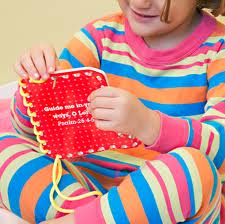
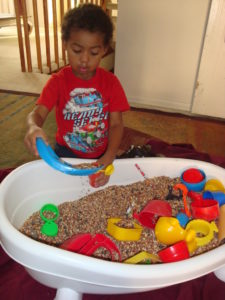
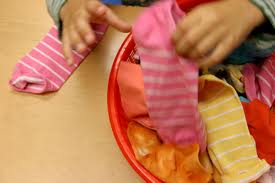

 Do you have cherished dreams? Is there a goal you want as much as breathing? Do you worry that because you chose to be a parent they may never come to pass?
Do you have cherished dreams? Is there a goal you want as much as breathing? Do you worry that because you chose to be a parent they may never come to pass?
 I bought Mom a beautiful fake flower in a glass bowl. My mother loves flowers, but we can’t have any living plants in her room because she pours water on them continually. There are some problems with that.
I bought Mom a beautiful fake flower in a glass bowl. My mother loves flowers, but we can’t have any living plants in her room because she pours water on them continually. There are some problems with that.
 I like Kerry Patterson. He is a great writer and from my era, so I relate to everything he writes. Back in September 2012, Kerry
I like Kerry Patterson. He is a great writer and from my era, so I relate to everything he writes. Back in September 2012, Kerry 


 I like things my way.
I like things my way.  In the fall of 2012, I had an experience at a friend’s home that caused me to pause and think about how I felt as I mothered my family, and I shared those feelings with my friend. I believed every word that I said to her. Every word!
In the fall of 2012, I had an experience at a friend’s home that caused me to pause and think about how I felt as I mothered my family, and I shared those feelings with my friend. I believed every word that I said to her. Every word!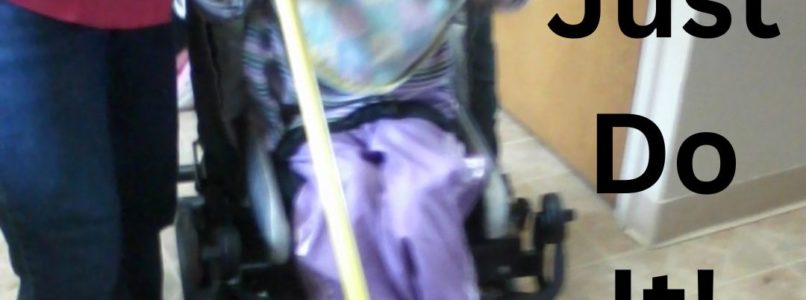
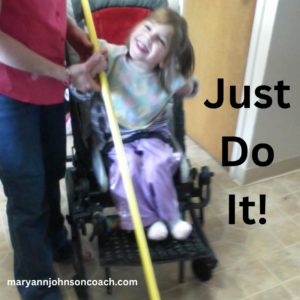 Back in 2013, when Jodie and her family moved into our three-bedroom apartment while looking for a new home, I was reminded of many things I had forgotten since my children had grown up and moved away. It takes flexibility to manage a family. Things don’t always go the way you plan, and moving forward when things aren’t just what you want, well, that is the road to feeling good as a family. Here is a peek back to that ‘learning’ time. By the way, Jodie was homeschooling Maggie and Jack and bringing Mary on board. It was a big load!
Back in 2013, when Jodie and her family moved into our three-bedroom apartment while looking for a new home, I was reminded of many things I had forgotten since my children had grown up and moved away. It takes flexibility to manage a family. Things don’t always go the way you plan, and moving forward when things aren’t just what you want, well, that is the road to feeling good as a family. Here is a peek back to that ‘learning’ time. By the way, Jodie was homeschooling Maggie and Jack and bringing Mary on board. It was a big load!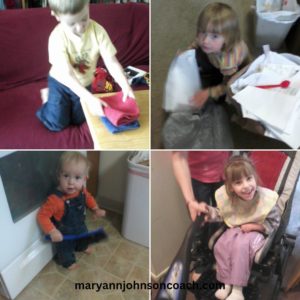 Family chores are one way that Jodie helps the children gain confidence and pride in their abilities. Jack was supposed to fold clothes. I saw Jodie pull folded dishcloths out of the drawer, unfold them, and give them to Jack to fold. (He didn’t see her unfold them.) This happened because there wasn’t any clean laundry to fold. It wasn’t that there wasn’t any laundry; it was just all still dirty. Often laundry takes a back seat to what really matters. : )
Family chores are one way that Jodie helps the children gain confidence and pride in their abilities. Jack was supposed to fold clothes. I saw Jodie pull folded dishcloths out of the drawer, unfold them, and give them to Jack to fold. (He didn’t see her unfold them.) This happened because there wasn’t any clean laundry to fold. It wasn’t that there wasn’t any laundry; it was just all still dirty. Often laundry takes a back seat to what really matters. : )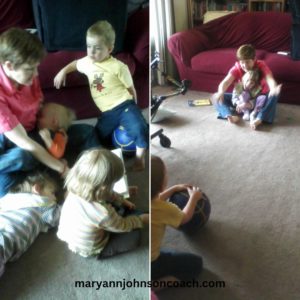 and Andy”. Then they played ball. Maggie needs help with this activity. Jack is a great big brother and did his part. Then we made hedgehogs.
and Andy”. Then they played ball. Maggie needs help with this activity. Jack is a great big brother and did his part. Then we made hedgehogs. I was so busy helping that I didn’t get a photo of the table before the project began. I would have loved for you to see it. It was a disaster. Most of what we used for dinner was still there from the night before. I am sorry to have to confess that, but there it is. Some nights we move on to something else right after the meal and often, well, we are tired. : ) Jodie did what any great mom would do. She pushed it out of the way and carried on.
I was so busy helping that I didn’t get a photo of the table before the project began. I would have loved for you to see it. It was a disaster. Most of what we used for dinner was still there from the night before. I am sorry to have to confess that, but there it is. Some nights we move on to something else right after the meal and often, well, we are tired. : ) Jodie did what any great mom would do. She pushed it out of the way and carried on.
 When we moved from Montana to Utah we helped our daughter purchase her first home. We lived in that home with her for a while. Then she married, and we moved two blocks away. Not long after that Maggie, our granddaughter with CP, was born.
When we moved from Montana to Utah we helped our daughter purchase her first home. We lived in that home with her for a while. Then she married, and we moved two blocks away. Not long after that Maggie, our granddaughter with CP, was born. see what was up. He was running his trucks through the maze laid out in a random pattern on practically every square inch of the living room floor. All’s well here, back to the “jelly” sauce.
see what was up. He was running his trucks through the maze laid out in a random pattern on practically every square inch of the living room floor. All’s well here, back to the “jelly” sauce. Meanwhile, the six-year-old was yelling for help with her iPad. Maggie has cerebral palsy and has a way of letting us all know when her iPad is not cooperating with her limited hand movement. Right now, she was letting me know…loudly.
Meanwhile, the six-year-old was yelling for help with her iPad. Maggie has cerebral palsy and has a way of letting us all know when her iPad is not cooperating with her limited hand movement. Right now, she was letting me know…loudly.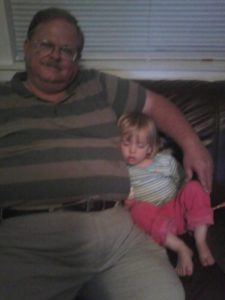 I holler to Jack, “Go tell Grandpa that grandma needs him…NOW!” I am 63 with a 64-year-old husband and three years ago our youngest child got married and left home. This was after 39 years of in-house parenting.
I holler to Jack, “Go tell Grandpa that grandma needs him…NOW!” I am 63 with a 64-year-old husband and three years ago our youngest child got married and left home. This was after 39 years of in-house parenting.